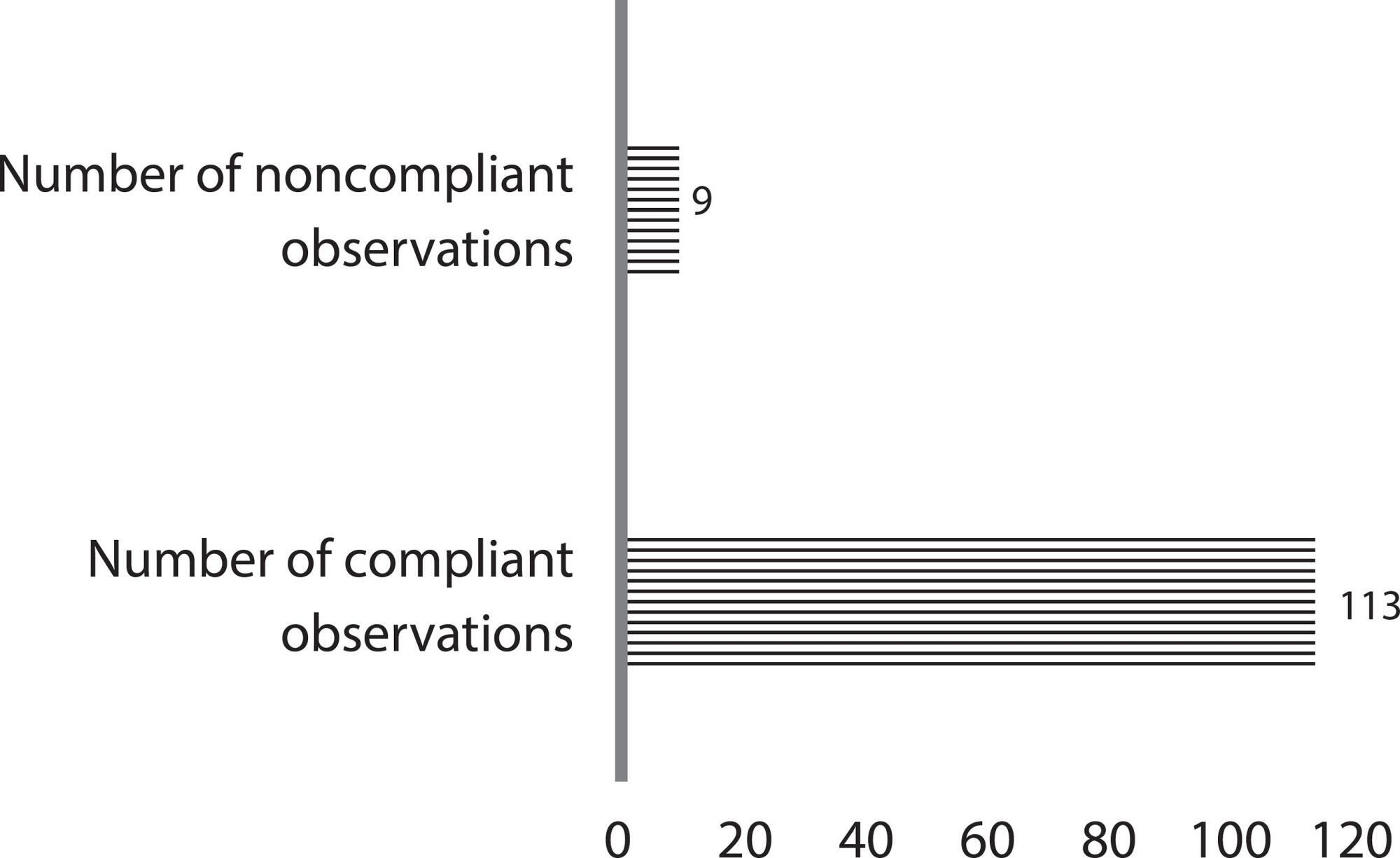-
RESEARCH
Quality of life assessment for health promotion groups
Revista Brasileira de Enfermagem. 2016;69(2):242-249
01-01-2016
Abstract
RESEARCHQuality of life assessment for health promotion groups
Revista Brasileira de Enfermagem. 2016;69(2):242-249
01-01-2016DOI 10.1590/0034-7167.2016690206i
Views0See moreABSTRACT
Objective:
to analyze the use of quality of life assessment (QOL) as a strategy to evaluate the work with health promotion groups in the community.
Method:
cross-sectional, descriptive and analytical study. Participants of two elderly groups (n=46) were individually interviewed to fill the sociodemographic instruments, WHOQOL-BREF and WHOQOL-OLD.
Results:
the participants were women with up to 79 years, who did not live with a partner, with up to four years of study, retired, with individual income of up to a minimum salary. The mean scores on the WHOQOL-BREF were higher on “Social Relations” and lower in the “Environment”. For the WHOQOL-OLD, the highest scores were achieved in facets “Social Participation” (G1) and “Past, Present and Future Activities” (G2), while “Death and Dying” facet obtained lower scores in both groups.
Conclusion:
the assessment of QOL appears to be useful in helping to identify the coordination aspects of life of elderly people that need to be better developed in groups.
-
RESEARCH
Transcultural adaptation and validation of the Brazilian version of Treatment Spirituality/Religiosity Scale
Revista Brasileira de Enfermagem. 2016;69(2):235-241
01-01-2016
Abstract
RESEARCHTranscultural adaptation and validation of the Brazilian version of Treatment Spirituality/Religiosity Scale
Revista Brasileira de Enfermagem. 2016;69(2):235-241
01-01-2016DOI 10.1590/0034-7167.2016690205i
Views0See moreABSTRACT
Objective:
to perform the translation and transcultural adaptation to Brazilian Portuguese, and analyze the psychometric properties of the instrument Treatment Spirituality/Religiosity Scale (TSRS).
Method:
the sample consisted of 188 nursing students of technical and higher education. The reliability analysis by test-retest was performed one month after the first application of the instrument. To measure the construct validation, a factorial analysis was carried out.
Results:
the Brazilian version of the TSRS consisted of 10 items, with two factors. The reliability by test-retest showed a Kappa coefficient ranging from 0.22 to 0.47, and a global internal consistency Cronbach’s alpha of 0.85.
Conclusion:
the Brazilian version of the TSRS showed satisfactory values of validity and internal consistency, being suitable for use in the national context.
-
RESEARCH
Epidemiological characteristics and causes of deaths in hospitalized patients under intensive care
Revista Brasileira de Enfermagem. 2016;69(2):229-234
01-01-2016
Abstract
RESEARCHEpidemiological characteristics and causes of deaths in hospitalized patients under intensive care
Revista Brasileira de Enfermagem. 2016;69(2):229-234
01-01-2016DOI 10.1590/0034-7167.2016690204i
Views0ABSTRACT
Objective:
to describe the epidemiological and sociodemographic characteristics of patients hospitalized in an ICU.
Method:
an epidemiological, descriptive and retrospective study. Population: 695 patients admitted from January to December 2011. The data collected were statistically analyzed with both absolute and relative frequency distribution.
Results:
61.6% of the patients are male, aged 40 to 69 years, and most of them came from the surgery rooms. The most frequent reason for admission was diseases of the circulatory system (23.3%). At discharge from the ICU, 72.4% of the patients were sent to other units of the same institution, 31.1% to the intermediate care unit, and 20.4% died, of which 24.6% from diseases of the circulatory system. The afternoon shift had 45.8% of the admissions and 53.3% of the discharges.
Conclusion:
the description of the sociodemographic and epidemiological features guides the planning of nursing actions, providing a better quality service.
Keywords:Critical CareDescriptive EpidemiologyIntensive Care UnitMorbidityMortality IndicatorsNursingSee more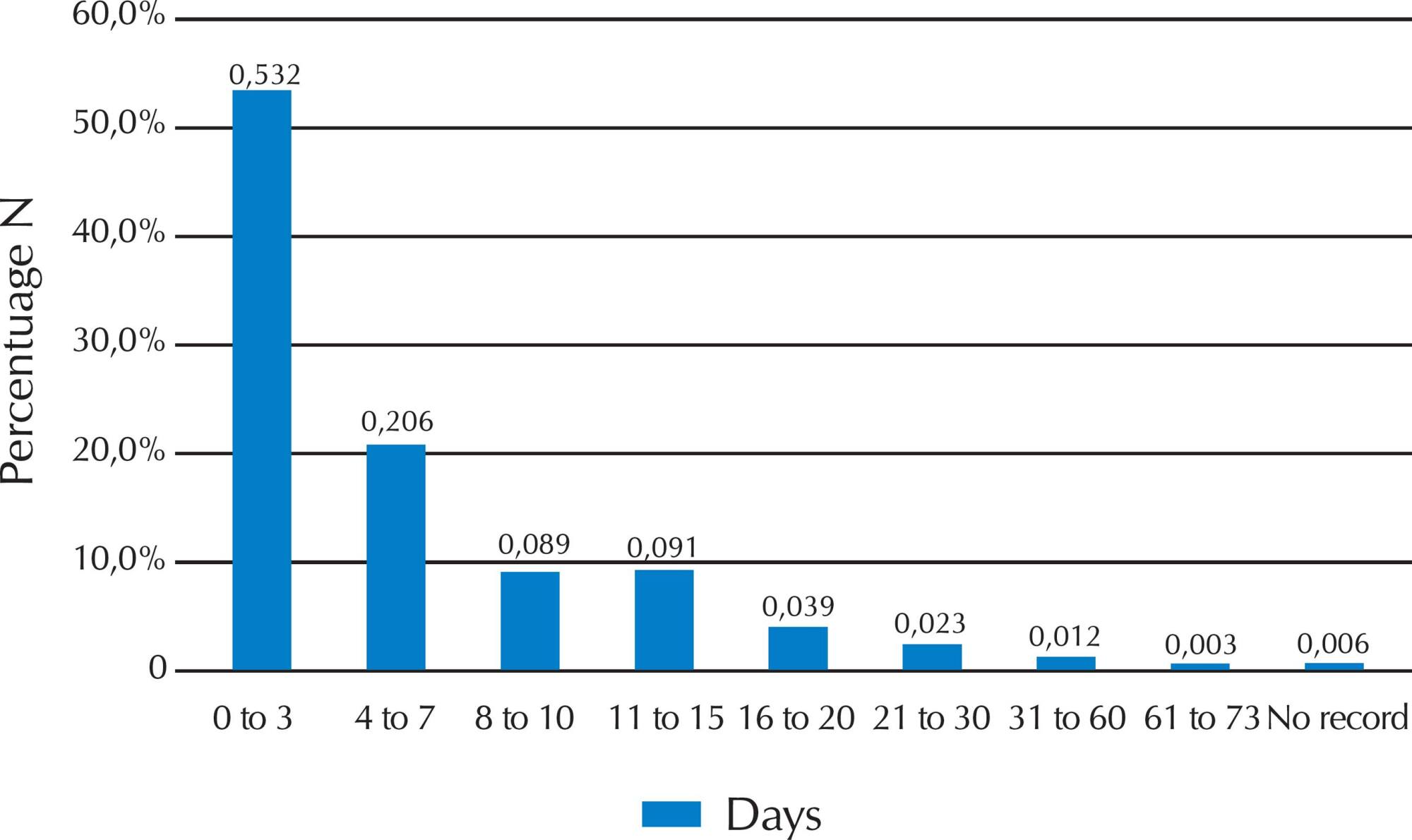
-
RESEARCH
Hospital discharge of premature newborns: the father’s experience
Revista Brasileira de Enfermagem. 2016;69(2):221-228
01-01-2016
Abstract
RESEARCHHospital discharge of premature newborns: the father’s experience
Revista Brasileira de Enfermagem. 2016;69(2):221-228
01-01-2016DOI 10.1590/0034-7167.2016690203i
Views0See moreABSTRACT
Objective:
To describe the father’s experience with his premature child discharge of the Neonatal Intensive-Care Unit and to point out interventions to promote this experience.
Method:
Qualitative research with eight fathers, adopting the Symbolic Interactionism as theoretical reference and thematic narrative research as methodological frame.
Results:
The analysis of data has allowed us to describe the experience of the father from three thematic units: “fatherhood boundaries”, “high responsibility for the child” and “social network and support”.
Conclusion:
The father feels insecure with the idea of taking care of his child at home because of the lack of professional support and the initial contact with the child in the Neonatal Intensive-Care Unit.
-
RESEARCH
Nurses from the Mobile Emergency Service: profile and developed activities
Revista Brasileira de Enfermagem. 2016;69(2):213-220
01-01-2016
Abstract
RESEARCHNurses from the Mobile Emergency Service: profile and developed activities
Revista Brasileira de Enfermagem. 2016;69(2):213-220
01-01-2016DOI 10.1590/0034-7167.2016690202i
Views0See moreABSTRACT
Objective:
to characterize the profile and identify the activities developed by nurses from the Mobile Emergency Care Service of a state of southern Brazil.
Method:
an exploratory, descriptive study. Data were collected through a questionnaire with 63 nurses.
Results:
the profile showed a workforce predominantly female, young and having specialized training. The activities were organized in the dimensions of caring, managing and educating, verifying the predominance of the first one. Care actions involved multiple procedures, but the use of the Systematization of Nursing Care (SNC) was not mentioned in the development of care activities. Then, the managerial dimension with a predominance of bureaucratic activities was emphasized. Educational activities were less prominent.
Conclusion:
care actions are the focus of the activities of nurses, predominantly the prescribed institutional care without the use of instruments such as SNC that could contribute to the greater visibility of their professional work.
-
EDITORIAL
Desafios e imperativos de liderança na cooperação com a Organização Mundial da Saúde
Revista Brasileira de Enfermagem. 2016;69(2):207-208
01-01-2016
Abstract
EDITORIALDesafios e imperativos de liderança na cooperação com a Organização Mundial da Saúde
Revista Brasileira de Enfermagem. 2016;69(2):207-208
01-01-2016DOI 10.1590/0034-7167.2016690201i
Views0Quando uma instituição promove inovações estratégicas, é colocado em curso o rompimento com a tradição, provocando mudanças e, por consequência, alterando as expectativas e as perspectivas tanto dos seus clientes internos, quanto dos seus clientes externos.Os motores das inovações adotadas são acionados por uma visão ampliada dos fins da organização, alargando suas fronteiras em termos […]See more -
EDITORIAL
Challenges and leadership imperatives in cooperation with the World Health Organization
Revista Brasileira de Enfermagem. 2016;69(2):207-208
01-01-2016
Abstract
EDITORIALChallenges and leadership imperatives in cooperation with the World Health Organization
Revista Brasileira de Enfermagem. 2016;69(2):207-208
01-01-2016DOI 10.1590/0034-7167.2016690201i
Views0When an institution promotes strategic innovations, it starts the rupture with tradition, causing changes and, consequently, altering the expectations and prospects of both their internal clients, as their external clients.The engines of the adopted innovations are driven by a broader view of the organization’s purposes, expanding its borders in terms of breadth and depth, which […]See more -
ERRATUM
ERRATUM
Revista Brasileira de Enfermagem. 2016;69(1):206-206
01-01-2016
Abstract
ERRATUMERRATUM
Revista Brasileira de Enfermagem. 2016;69(1):206-206
01-01-2016DOI 10.1590/0034-7167.20166901e02
Views0In the article “Conceptions of mid-level nursing professionals facing those with a chemical dependency”, with the number of DOI: 10.1590/0034-7167.2015680610i, published in the journal Revista Brasileira de Enfermagem, v68(6):755-60, page 760 that read:“8. Vargas D, Soares J. Knowledge and attitudes of nurses towards alcohol and related problems: the impact of an educational intervention. Rev Esc […]See more
-
ORIGINAL ARTICLE
Educational technology for multidisciplinary training for managing waiting lists for elective patients
Revista Brasileira de Enfermagem. 2024;77(3):e20230299
07-29-2024
Abstract
ORIGINAL ARTICLEEducational technology for multidisciplinary training for managing waiting lists for elective patients
Revista Brasileira de Enfermagem. 2024;77(3):e20230299
07-29-2024DOI 10.1590/0034-7167-2023-0299
Views1See moreABSTRACT
Objectives:
to construct and assess an educational technology for managing patient waiting lists for multidisciplinary training.
Methods:
study supported by Instructional Design – ADDIE model, whose stages of construction of educational technology were developed in the form of a multi-professional training course. Its respective content assessment was carried out by a committee of experts from 2021 to 2022. The analysis occurred based on the proportion of content adequacy with 95% Confidence Interval.
Results:
seventeen products were created as educational technology learning objects: five storyboards; four videos; three comic books; two pedagogical action plans; a mind map; and a YouTube® playlist. Nine experts assessed content adequacy, which reached 0.89.
Conclusions:
this educational technology contributes to the performance of professionals who manage waiting lists by reducing inequalities, alleviating differences, in addition to promoting equity in care and good health for patients in the Brazilian Health System.

-
ORIGINAL ARTICLE
Adaptation and validation of an adult patient classification instrument with emphasis on the family dimension
Revista Brasileira de Enfermagem. 2023;76(2):e20220530
03-27-2023
Abstract
ORIGINAL ARTICLEAdaptation and validation of an adult patient classification instrument with emphasis on the family dimension
Revista Brasileira de Enfermagem. 2023;76(2):e20220530
03-27-2023DOI 10.1590/0034-7167-2022-0530
Views1ABSTRACT
Objectives:
to adapt and validate an instrument for classifying adult patients that emphasizes the family support network in the demand for nursing care.
Methods:
methodological study, carried out in three phases: adaptation of an instrument considering the reality of adult patients; content validation with seven experts and assessment of measurement properties (construct validity and internal consistency) with 781 hospitalized patients.
Results:
in content validation, the indicators reached the values established for the Content Validity Index (0.85-1.00). In the confirmatory factor analysis, the 11 indicators were distributed in three domains and presented average variance extracted and factor loading greater than 0.5. Composite reliability was greater than 0.7.
Conclusions:
the present study adapted and made available, with evidence of validity and reliability, an instrument for classifying adult patients that considers the family support network in the demand for nursing care.
Keywords:Factor AnalysisFamilyHospital Organization and AdministrationPatient-Centered CareValidation StudiesSee more
-
ORIGINAL ARTICLE
Guide for Systematization of Care and Nursing Process: educational technology for professional practice
Revista Brasileira de Enfermagem. 2023;76:e20210975
04-14-2023
Abstract
ORIGINAL ARTICLEGuide for Systematization of Care and Nursing Process: educational technology for professional practice
Revista Brasileira de Enfermagem. 2023;76:e20210975
04-14-2023DOI 10.1590/0034-7167-2021-0975
Views1ABSTRACT
Objective:
to elaborate and validate the content of a digital guide educational technology on Systematization of Nursing Care and Nursing Process.
Methods:
applied research of technological development, developed between 2020 and 2021, in three steps. First, a scoping review was carried out to elaborate the content. In the second step, the content was validated with 46 nurse judges selected for convenience. The minimum criterion of agreement among judges was 80%. The third step consisted of content organization and layout.
Results:
the guide content was elaborated from the Federal Nursing Council legislation, scientific articles and textbooks. Content was considered appropriate, relevant and organized by judges.
Final considerations:
the digital guide is an alternative that can contribute to the NP execution and implementation, supporting the planning and implementation of actions for quality of care.
Keywords:Educational TechnologyNursing ProcessNursing RecordsProfessional PracticeStandardized Nursing TerminologySee more
-
ERRATUM
ERRATUM
Revista Brasileira de Enfermagem. 2024;77(1):e2024n1e01
01-15-2024
Abstract
ERRATUMERRATUM
Revista Brasileira de Enfermagem. 2024;77(1):e2024n1e01
01-15-2024DOI 10.1590/0034-7167.20247701e01
Views1In the article “The ethics of nursing care for transgender people”, with DOI number: , published in Revista Brasileira de Enfermagem, 2023;76(Suppl 3):e20220797, in authorship:Where it read:[…]See more -
ORIGINAL ARTICLE
Validity of the TBApp mobile application for self-care management for people with tuberculosis
Revista Brasileira de Enfermagem. 2024;77(2):e20230195
06-14-2024
Abstract
ORIGINAL ARTICLEValidity of the TBApp mobile application for self-care management for people with tuberculosis
Revista Brasileira de Enfermagem. 2024;77(2):e20230195
06-14-2024DOI 10.1590/0034-7167-2023-0195
Views1See moreABSTRACT
Objectives:
to describe the validity process of the TBApp mobile application for self-care management for people with tuberculosis linked to Primary Health Care.
Methods:
methodological research developed with ten expert judges, carried out virtually. The application was assessed in relation to content and technology quality in seven domains (objectivity; structure and appearance; relevance; functionality; reliability; usability; and efficiency), using an instrument with a Likert scale.
Results:
TBApp was considered valid, relevant, functional, reliable and effective by expert judges. The objectives, structure and presentation and relevance domains presented an overall Content Validity Index of 0.93, and the functionality, reliability, usability and efficiency domains presented characteristics and sub-characteristics values greater than 0.80.
Conclusions:
TBApp is a creative and innovative tool that can be used by people with TB and disseminated in the scientific community.
-
ORIGINAL ARTICLE
The nursing practice environment and hospital sociotechnical complexity: a mixed-methods study
Revista Brasileira de Enfermagem. 2024;77(6):e20230315
12-16-2024
Abstract
ORIGINAL ARTICLEThe nursing practice environment and hospital sociotechnical complexity: a mixed-methods study
Revista Brasileira de Enfermagem. 2024;77(6):e20230315
12-16-2024DOI 10.1590/0034-7167-2023-0315
Views1See moreABSTRACT
Objectives:
to analyze the relationship between the nursing practice environment and hospital sociotechnical complexity as perceived by nurses.
Methods:
a sequential explanatory mixed-methods study was conducted in a hospital in southern Brazil. The Brazilian version of the Practice Environment Scale-Nursing Work Index and the Complexity Characterization Questionnaire were administered to 132 nurses. Subsequently, semi-structured interviews were conducted with 18 participants, and the data were subjected to thematic analysis. Data integration was achieved through a connection approach.
Results:
the nursing practice environment was found to be favorable, except in the subscale concerning Staffing and Resource Adequacy, where complexity was present in the activities. The three emerging categories explained human and technical aspects related to complexity in the practice environment, quality of care, and patient safety. Unexpected variability was inversely correlated with the practice environment.
Conclusions:
the study results indicate a relationship between these constructs, with implications for the quality and the safety of care.

-
REVIEW
Recommendations for guidelines for promoting mental health in the workplace: an umbrella review
Revista Brasileira de Enfermagem. 2024;77(6):e20240086
12-16-2024
Abstract
REVIEWRecommendations for guidelines for promoting mental health in the workplace: an umbrella review
Revista Brasileira de Enfermagem. 2024;77(6):e20240086
12-16-2024DOI 10.1590/0034-7167-2024-0086
Views1See moreABSTRACT
Objectives:
to summarize the recommendations of guidelines for promoting mental health in the workplace.
Methods:
an umbrella review, according to Joanna Briggs Institute and Preferred Reporting Items for Systematic reviews and Meta-Analyses methodological assumptions. Data collection was carried out in January 2021 and updated in July 2023 in the American Psychological Association, Cochrane Library, EMBASE, National Library of Medicine, and Scopus databases. Systematic reviews that assessed guidelines with recommendations for mental health care for workers were included. PROSPERO registration CRD42023461845.
Results:
four systematic reviews published between 2015 and 2018 were identified. The abstracts highlighted actions that facilitate and inhibit the recommendations as well as three categories of intervention: primary prevention – worker protection; secondary prevention – promoting workers’ mental health; and tertiary prevention – supporting, monitoring and rehabilitating workers upon returning to work.
Conclusions:
the interventions are based on prevention, promotion and early recognition, support and rehabilitation of mental health problems.

-
Evolution of nursing teaching in the use of education technology: a scoping review
Revista Brasileira de Enfermagem. 2021;74:e20200422
05-21-2021
Abstract
Evolution of nursing teaching in the use of education technology: a scoping review
Revista Brasileira de Enfermagem. 2021;74:e20200422
05-21-2021DOI 10.1590/0034-7167-2020-0422
Views1See moreABSTRACT
Objective:
To identify and map the technological tools of information and communication to support the teaching learning process in Nursing teaching courses.
Methods:
This is a scoping review whose search was carried out in seven databases and in grey literature. After an initial analysis of the selection, 88 texts were read integrally, and 29 made up the final sample.
Results:
Virtual learning environment and object, simulation, hypermedia, and software or cellphone applications were the tools the nursing professors used the most. Studies highlight that the application of technology was important in the teaching-learning process, since it encouraged teaching based on safe care, motivating and developing abilities/competences, supported on significant, effective, flexible, and autonomous learning.
Conclusion:
The contribution of the technology for nursing formation stands out, but it should be highlighted that its employment must be critical, reflective, based on pedagogical theories and developed by trained professors.

-
Contents related to nursing professionals during the COVID-19 pandemic on the Youtube™ platform
Revista Brasileira de Enfermagem. 2021;74:e20200581
02-05-2021
Abstract
Contents related to nursing professionals during the COVID-19 pandemic on the Youtube™ platform
Revista Brasileira de Enfermagem. 2021;74:e20200581
02-05-2021DOI 10.1590/0034-7167-2020-0581
Views0See moreABSTRACT
Objective:
to characterize the content of Youtube™ videos related to nursing professionals during the COVID-19 pandemic.
Method:
a qualitative study that examined 47 videos on Youtube™ posted between 11/03 and 11/04 2020, which were subjected to thematic analysis.
Results:
four categories emerged: “the role of nurses in care production during the pandemic”, which addresses the management of services and individual care; “Overview of the pandemic from the perspective of nurses in different countries”, presenting experiences and encouraging physical distance; “Tributes and motivation to mobilize the category”, in addition to targeted tributes, calls for nurses to claim their rights; “Criticisms and demands to improve working conditions”, which highlights the insecurity of care provision settings.
Final considerations:
nursing work conditions in different countries, recognition of the importance of professionals during the pandemic, and claims of the category to improve working conditions were the main content found on Youtube™.
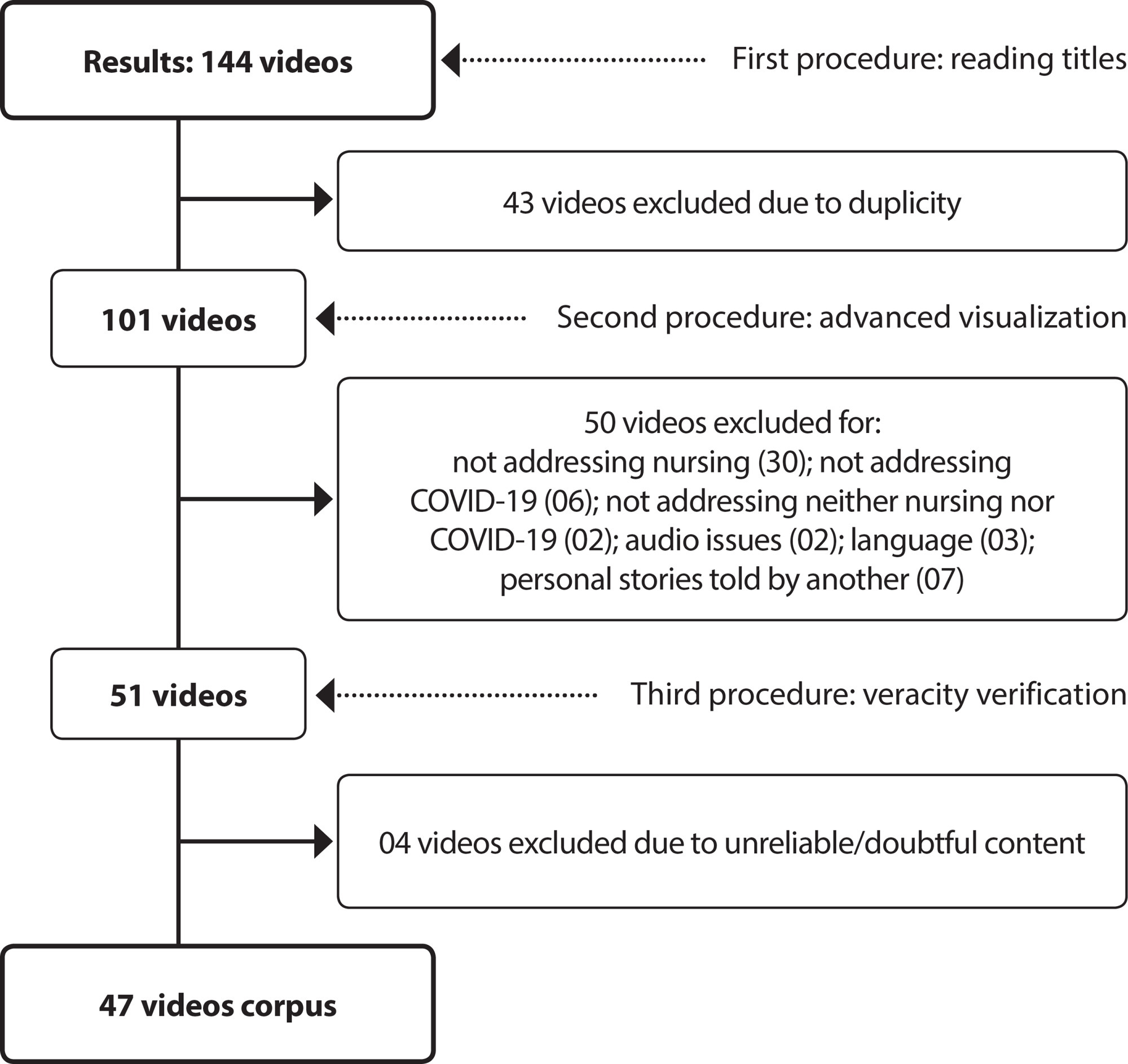
-
REVIEW
Prevention and control measures for neonatal COVID-19 infection: a scoping review
Revista Brasileira de Enfermagem. 2020;73:e20200467
07-13-2020
Abstract
REVIEWPrevention and control measures for neonatal COVID-19 infection: a scoping review
Revista Brasileira de Enfermagem. 2020;73:e20200467
07-13-2020DOI 10.1590/0034-7167-2020-0467
Views0See moreABSTRACT
Objective:
to identify with the literature the measures to prevent and control neonatal infection by COVID-19.
Methods:
a scope review carried out by searching for studies in databases and institutional health websites. The final sample was 25 articles.
Results:
among the main measures are the use of masks by suspected or infected people in contact with healthy newborns, hand hygiene before and after each care and feeding as well as the tools used for milking. It is indispensable to use personal protective equipment by health professionals in neonatology services to maintain a private room for infected newborns or to use physical barriers. Early diagnosis and timely case management is essential to reduce virus transmissibility.
Conclusions:
the research contributed to elucidate health and nursing actions in preventing and controlling neonatal infection by COVID-19.

-
REVIEW
Prevention and conduct against the Extravasation of antineoplastic chemotherapy: a scoping review
Revista Brasileira de Enfermagem. 2020;73(4):e20190008
06-17-2020
Abstract
REVIEWPrevention and conduct against the Extravasation of antineoplastic chemotherapy: a scoping review
Revista Brasileira de Enfermagem. 2020;73(4):e20190008
06-17-2020DOI 10.1590/0034-7167-2019-0008
Views0ABSTRACT
Objectives:
to identify and synthesize scientific evidence on prevention and management of extravasation of antineoplastic agents in adult patients by nurses.
Methods:
scoping review, according to Joanna Briggs Institute and PRISMA-ScR. Research was conducted in five electronic databases, Cochrane Library and eight catalogs of theses and dissertations. Data collection occurred from April to July 2018, with no time limit. The extracted data were analyzed and synthesized in a narrative way.
Results:
a total of 3,110 records were retrieved and 18 studies were kept for review. Most publications (66.6%) had a qualitative approach and addressed both aspects, i.e., prevention and management of extravasation of chemotherapy in adult patients.
Conclusions:
the implementation of protocols based on scientific evidence on prevention and management of extravasation of antineoplastic agents is paramount in order to provide patient safety and support to the nursing staff.
Keywords:Antineoplastic AgentsCombined ChemotherapyExtravasation of Therapeutic and Diagnostic MaterialsNursing CareOncologySee more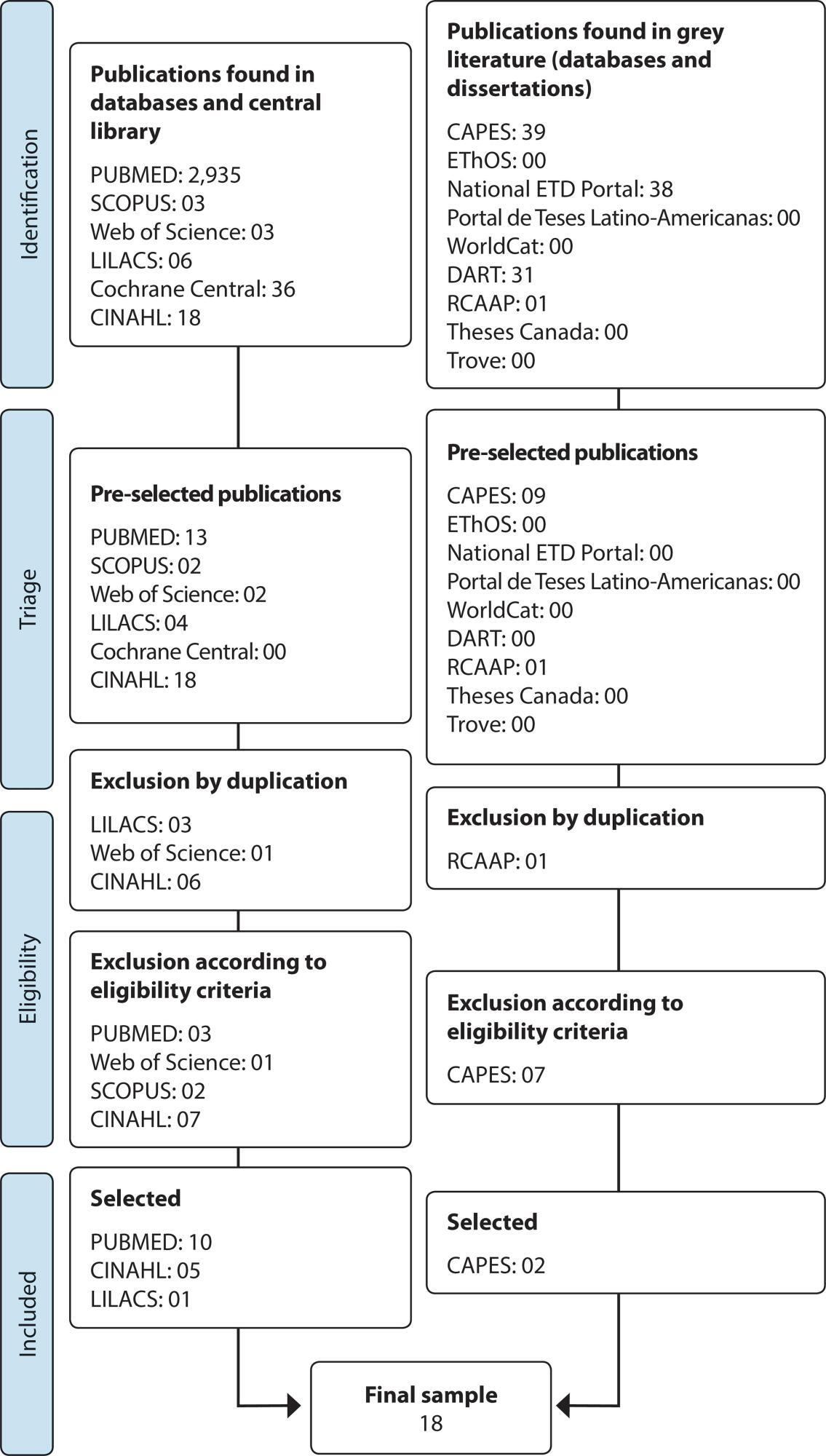
-
REFLECTION
Training and work process in Multiprofessional Residency in Health as innovative strategy
Revista Brasileira de Enfermagem. 2020;73(6):e20190635
09-07-2020
Abstract
REFLECTIONTraining and work process in Multiprofessional Residency in Health as innovative strategy
Revista Brasileira de Enfermagem. 2020;73(6):e20190635
09-07-2020DOI 10.1590/0034-7167-2019-0635
Views0ABSTRACT
Objectives: To
reflect about education in health and work process on three programs of multiprofessional residency in Florianópolis/SC.
Method:
Reflexive study about Multiprofessional Residency Health Programs of Florianópolis.
Results:
Multiprofessional Residency characterizes training health professionals through service education. Developing these professionals’ specialization with assignments that promote professional exercise and magnifies multiprofessional work at the same time, for excellency in unabridged healthcare.
Final Considerations:
Multiprofessional Residency Programs make interdisciplinary education, sharing knowledge between residents and other professionals stimulating development of innovation skills.
Keywords:Euducation, GraduateHealth PersonneInternship and ResidencyInterprofessional RelationsProfessional PracticeSee more -
ORIGINAL ARTICLE
Understanding the dramatic therapeutic play session: a contribution to pediatric nursing
Revista Brasileira de Enfermagem. 2020;73(4):e20180812
06-08-2020
Abstract
ORIGINAL ARTICLEUnderstanding the dramatic therapeutic play session: a contribution to pediatric nursing
Revista Brasileira de Enfermagem. 2020;73(4):e20180812
06-08-2020DOI 10.1590/0034-7167-2018-0812
Views0See moreABSTRACT
Objectives:
to understand how the dramatic therapeutic play session occurs within the care of hospitalized children.
Methods:
qualitative multiple case study, using theoretical references, such as symbolic interactionism and Vygotsky’s theory of symbolic play. Twenty play sessions performed with six children from 3 to 10 years old were analyzed, each corresponding to one case.
Results:
these sessions demonstrated that a dramatic therapeutic play session is a process of four interdependent and complementary steps: bonding, exploring, dramatizing, and play cessation. They also revealed the imaginary situations externalized by the child, the importance of the exploration step for which they manage the imaginary situation and catharsis, and how her higher psychological faculties are articulated during this process.
Final Considerations:
the results contribute to the understanding of the conduct and analysis of the dramatic therapeutic play session, reinforcing the importance of its use in pediatric nursing care practice.
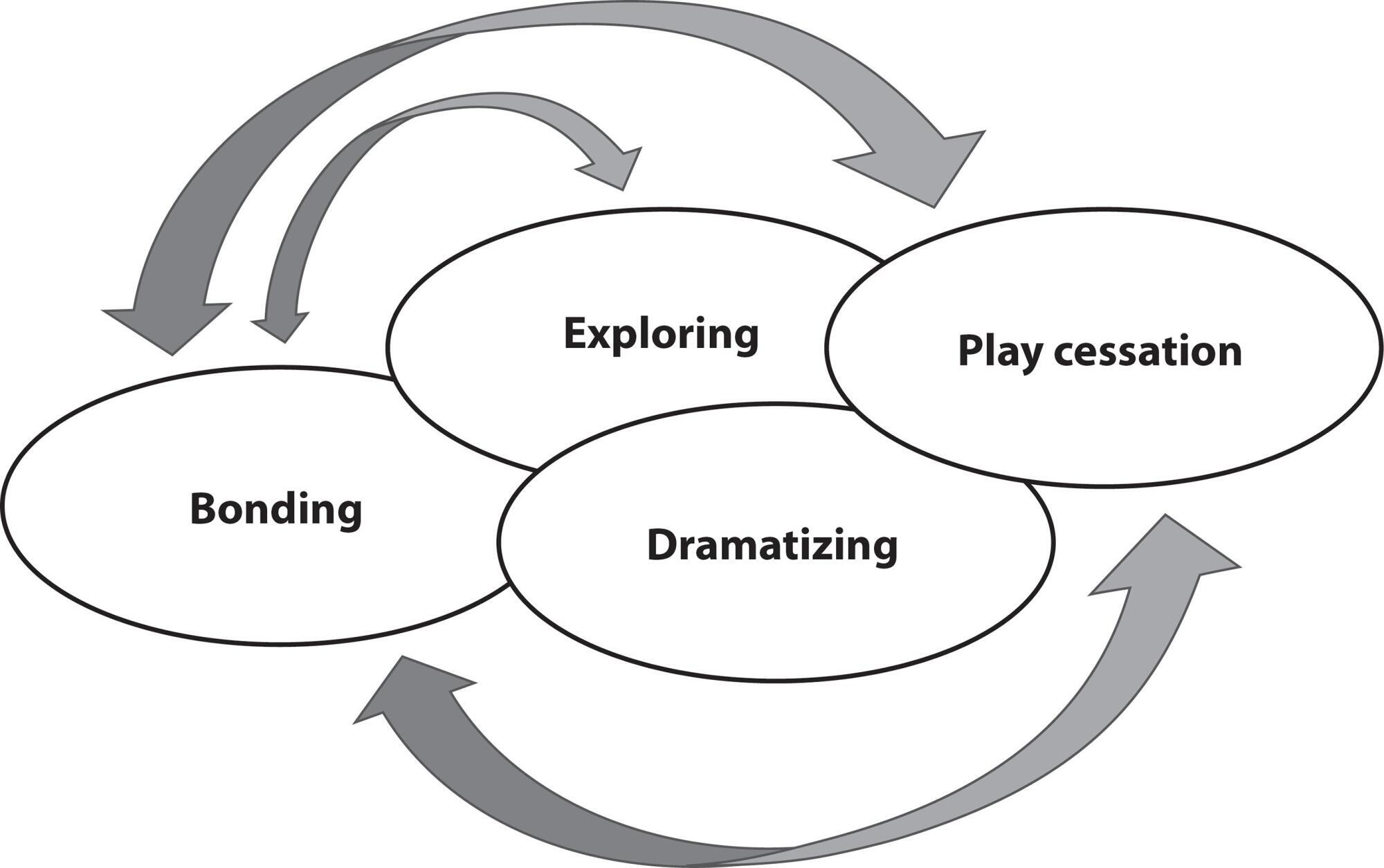
-
ORIGINAL ARTICLE
Common mental disorders in nursing students of the professionalizing cycle
Revista Brasileira de Enfermagem. 2020;73(1):e20180154
02-10-2020
Abstract
ORIGINAL ARTICLECommon mental disorders in nursing students of the professionalizing cycle
Revista Brasileira de Enfermagem. 2020;73(1):e20180154
02-10-2020DOI 10.1590/0034-7167-2018-0154
Views0See moreABSTRACT
Objectives:
to verify the suspicion of common mental disorders in nursing students of the professionalizing cycle and the association with sociodemographic features.
Method:
cross-sectional study with a sample of 85 students from a public university in the state of Rio de Janeiro (RJ) who responded to the Self-Report Questionnaire-20 and sociodemographic questions.
Results:
the suspicion prevalence of common mental disorders (CMD) in the sample was 55.3% and it was identified the association with the consumption of alcohol. Of the most frequent SRQ-20 complaints, 95.3% reported “feeling nervous, tense or worried”, 72.9% “having difficulty making decisions”, 60% “sleeping poorly” and 37.6% “having lost interest by things “.
Conclusion:
high prevalence of CMD in the sample and the association with the consumption of alcohol requires preventive and therapeutic actions among the students that minimize the possibility of severe mental disorders related to the consumption of alcohol and other drugs.
Search
Search in:
Nuvem de Tags
Aged (144) Atenção Primária à Saúde (239) COVID-19 (104) Cuidados de Enfermagem (269) Educação em Enfermagem (151) Educação em Saúde (139) Enfermagem (930) Estudos de Validação (131) Health Education (144) Idoso (208) Mental Health (149) Nursing (987) Nursing Care (306) Patient Safety (151) Primary Health Care (284) Qualidade de Vida (104) Quality of Life (106) Saúde Mental (145) Segurança do Paciente (150) Validation Studies (108)




